|
|
|
Sort Order |
|
|
|
Items / Page
|
|
|
|
|
|
|
| Srl | Item |
| 1 |
ID:
044956


|
|
|
|
|
| Publication |
New York, Oxford University Press, 1970.
|
| Description |
viii,222p.
|
|
|
|
|
|
|
|
|
|
|
|
Copies: C:1/I:0,R:0,Q:0
Circulation
| Accession# | Call# | Current Location | Status | Policy | Location |
| 007879 | 330.98/STE 007879 | Main | On Shelf | General | |
|
|
|
|
| 2 |
ID:
150722
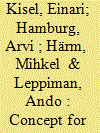

|
|
|
|
|
| Summary/Abstract |
The following paper presents a discussion of short- and long-term energy security assessment methods and indicators. The aim of the current paper is to describe diversity of approaches to energy security, to structure energy security indicators used by different institutions and papers, and to discuss several indicators that also play important role in the design of energy policy of a state. Based on this analysis the paper presents a novel Energy Security Matrix that structures relevant energy security indicators from the aspects of Technical Resilience and Vulnerability, Economic Dependence and Political Affectability for electricity, heat and transport fuel sectors. Earlier publications by different authors have presented energy security assessment methodologies that use publicly available indicators from different databases. Current paper challenges viability of some of these indicators and introduces new indicators that would deliver stronger energy security policy assessments. Energy Security Matrix and its indicators are based on experiences that the authors have gathered as high-level energy policymakers in Estonia, where all different aspects of energy security can be observed.
|
|
|
|
|
|
|
|
|
|
|
|
|
|
|
|
| 3 |
ID:
071341
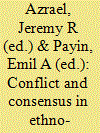

|
|
|
|
|
| Publication |
Santa Monica, Rand Corporation, 1998.
|
| Description |
vii, 53p.
|
| Standard Number |
0833025937
|
|
|
|
|
|
|
|
|
|
|
|
Copies: C:1/I:0,R:0,Q:0
Circulation
| Accession# | Call# | Current Location | Status | Policy | Location |
| 039946 | 320.80947/AZR 039946 | Main | On Shelf | General | |
|
|
|
|
| 4 |
ID:
175316


|
|
|
|
|
| Summary/Abstract |
Arms dependency is typically framed as a security issue that states seek to avoid. Dependency creates an opportunity for an exporter to attempt to exert influence over the importer’s foreign and domestic policy. However, the arms trade is a trade and influence attempts to create economic costs for exporters by damaging relationships with current and potential customers. Thus, heavily dependent states do not necessarily need to change suppliers to avoid the threat. Additionally, as arms transfers are a signal of political support, dependency may be a sign of a mutually beneficial relationship rather than one that is potentially dangerous. This article evaluates these arguments using logistic regression models to evaluate changes in suppliers of major weapons systems. It finds that the relationship between dependence and arms transfers is more complex than previously argued where the nature of the relationship depends both on the type of exporter and the type of arm being exported.
|
|
|
|
|
|
|
|
|
|
|
|
|
|
|
|
| 5 |
ID:
129494


|
|
|
|
|
| Publication |
2014.
|
| Summary/Abstract |
This study revisits the causal linkages between military spending and economic growth in China and G7 countries (i.e. Canada, France, Germany, Italy, Japan, the UK, and the USA) by focusing country-specific analysis for the period 1988-2010. The panel causality analysis, which accounts for both cross-country dependency and heterogeneity across countries, is employed in this study. Our results find evidence of the neutrality hypothesis for Italy, France, and Germany, the military spending-growth detriment hypothesis for both Canada and the UK, and one-way Granger causality running from economic growth to military spending for China. Furthermore, we find a feedback between military spending and economic growth in both Japan and the USA. Thus, our results do not support that one size fits all.
|
|
|
|
|
|
|
|
|
|
|
|
|
|
|
|
| 6 |
ID:
121115
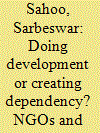

|
|
|
|
|
| Publication |
2013.
|
| Summary/Abstract |
This paper examines the role of non-government organisations (NGOs) and the implications for democratisation in India. By analysing one such organisation, this paper argues that NGOs do not always contribute positively to the democratisation process. It shows how Seva Mandir, an NGO working in the tribal areas of Rajasthan, has adopted a purely technocratic and apolitical service delivery approach and promoted a neo-liberal model of development. The unintended consequence of promoting this model has been the growth of a culture of 'organised dependency' at the grass-roots level, which has adversely affected the larger objectives of empowerment and democratisation.
|
|
|
|
|
|
|
|
|
|
|
|
|
|
|
|
| 7 |
ID:
172039
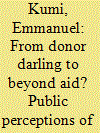

|
|
|
|
|
| Summary/Abstract |
In recent years, there has been growing interest among lower-middle income countries (LMICs) to reduce their dependence on donor resources, framed normatively as ‘beyond aid’. Yet, public perceptions about beyond aid narratives remain under-studied. This article explores current public perceptions in Ghana about the ‘Ghana Beyond Aid’ (GhBA) vision aimed at promoting structural economic transformation through the use of national resources while reducing dependence on donor aid. Drawing on 67 semi-structured interviews with government officials, civil society organisations (CSOs), donor representatives, academics, ‘ordinary citizens’ and media reviews, this article examines public understanding, rationale and perceived barriers to the implementation of the GhBA vision. I show that while GhBA is a welcome development for promoting structural economic transformation and ownership over national development priorities, mechanisms for propelling the GhBA are largely absent. Achieving GhBA will require a conscious effort by government and stakeholders to move beyond political rhetoric and partisan politics to setting out clear policy direction in addition to building a national consensus in promoting the vision. Implications of the research findings are discussed.
|
|
|
|
|
|
|
|
|
|
|
|
|
|
|
|
| 8 |
ID:
176539


|
|
|
|
|
| Summary/Abstract |
Donald Trump’s presidency may have altered less in relations between the United States and the Gulf Cooperation Council than recent accounts suggest. Instead, power relations between the US and its Gulf allies have long been, and continue to be, asymmetrical. Dependency theory and postcolonial analysis illustrate the ways in which the US global hegemon exhibits hierarchy, exerting control over Gulf economic resources (oil) and extending its ‘security umbrella’ (e.g. weapons sales and bases) – all in highly unequal dynamics. A critical discourse analysis of American and Saudi speeches during the 2017 Riyadh summit further confirms this assessment. This raises questions about alliance-making and alliance-maintenance norms of promise-keeping and reciprocity.
|
|
|
|
|
|
|
|
|
|
|
|
|
|
|
|
| 9 |
ID:
112381


|
|
|
|
|
| Publication |
2012.
|
| Summary/Abstract |
This paper draws on Okot p'Bitek's Song of Lawino and other critical voices to argue that education in Africa is victim of a resilient colonial and colonizing epistemology, which takes the form of science as ideology and hegemony. Postcolonial African elite justify the resilience of this epistemology and the education it inspires with rhetoric on the need to be competitive internationally. The outcome is often a devaluation of African creativity, agency and value systems, and an internalized sense of inadequacy. Education has become a compulsion for Africans to 'lighten their darkness' both physically and metaphorically in the interest of and for the gratification of colonizing and hegemonic others. The paper calls for paying more attention to popular systems of knowledge, in which reality is larger than logic. It calls for listening to ordinary men and women who, like p'Bitek's Lawino, are challenging the prescriptive gaze and grip of emasculated elite.
|
|
|
|
|
|
|
|
|
|
|
|
|
|
|
|
| 10 |
ID:
180346


|
|
|
|
|
| Summary/Abstract |
Trust between actors is vital to delivering positive health outcomes, while relationships of power determine health agendas, whose voices are heard and who benefits from global health initiatives. However, the relationship between trust and power has been neglected in the literatures on both international politics and global health. We examine this relationship through a study of relations between faith based organisations (FBO) and donors in Malawi and Zambia, drawing on 66 key informant interviews with actors central to delivering health care. From these two cases we develop an understanding of ‘trust as belonging’, which we define as the exercise of discretion accompanied by the expression of shared identities. Trust as belonging interacts with power in what we term the ‘power-trust cycle’, in which various forms of power undergird trust, and trust augments these forms of power. The power-trust cycle has a critical bearing on global health outcomes, affecting the space within which both local and international actors jockey to influence the ideologies that underpin global health, and the distribution of crucial resources. We illustrate how the power-trust cycle can work in both positive and negative ways to affect possible cooperation, with significant implications for collective responses to global health challenges.
|
|
|
|
|
|
|
|
|
|
|
|
|
|
|
|
| 11 |
ID:
091732


|
|
|
|
|
| Publication |
2009.
|
| Summary/Abstract |
Based on a case study of an export-oriented Bangladeshi garment company, this article shows how hierarchies of vulnerability have developed in the process of global integration of Bangladesh's garment industry. Situating the problem of economic dependency in a globalised context within a broader political economy discussion of local Bangladeshi scenarios, the study illustrates how such patterns of development are shaped by internal as well as external social and political forces that create conditions of vulnerability.
|
|
|
|
|
|
|
|
|
|
|
|
|
|
|
|
| 12 |
ID:
128877
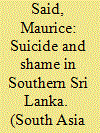

|
|
|
|
|
| Publication |
2014.
|
| Summary/Abstract |
This article shows how successful youth suicides and attempted suicides in the south of Sri Lanka are utilised as tools against an oppressive and limiting kinship structure. The majority of youth suicides in southern Sri Lanka appear to be aimed at disempowering close kin and publicly challenge the moral authority of the kin network, resulting in cleavages in the local distribution of power and status. The forms of suicide imbue the victim's family with shame, thus questioning and challenging the 'boundedness' of the family unit. Using three contrasting case studies involving a domestic argument between a young man and his spouse, a young couple from rival families, and a young woman in a post-tsunami camp, this fieldwork-based research illustrates how youth suicides bring to the fore internal tensions in the family.
|
|
|
|
|
|
|
|
|
|
|
|
|
|
|
|
| 13 |
ID:
025281


|
|
|
|
|
| Publication |
Boulder, Westview Press, 1984.
|
| Description |
xiii, 178p
|
| Standard Number |
0813300371
|
|
|
|
|
|
|
|
|
|
|
|
Copies: C:1/I:0,R:0,Q:0
Circulation
| Accession# | Call# | Current Location | Status | Policy | Location |
| 025418 | 338.9/CHI 025418 | Main | On Shelf | General | |
|
|
|
|
| 14 |
ID:
162977


|
|
|
|
|
| Summary/Abstract |
After Civil War (1936–1939), economic scarcity and political isolation reduced Spanish energy imports to about 10%. After a decade of stagnation, Spanish economy recovered, industrialized and boomed. Without domestic resources, this process largely depended on foreign imports. This paper analyzes the different actors involved in developing the infrastructural and institutional networks that enabled those imports. While it focuses on the Francoist regime (1939–1975) it is attentive to continuities and changes with respect to prior and, particularly, later periods.
|
|
|
|
|
|
|
|
|
|
|
|
|
|
|
|
|
|
|
|
|